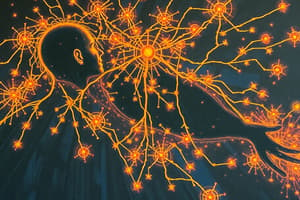Podcast
Questions and Answers
Which area of the brain is primarily responsible for processing visual information?
Which area of the brain is primarily responsible for processing visual information?
- Occipital lobe (correct)
- Parietal lobe
- Temporal lobe
- Frontal lobe
What aspect of cognitive functions is primarily involved in problem-solving and logical thinking?
What aspect of cognitive functions is primarily involved in problem-solving and logical thinking?
- Memory
- Language
- Reasoning (correct)
- Attention
Which function is NOT typically associated with emotional regulation?
Which function is NOT typically associated with emotional regulation?
- Activation of the HPA axis during stress
- Maintaining body temperature (correct)
- Understanding social interactions
- Processing and expressing emotions
Which stage of sleep is associated with vivid dreams and is known as REM sleep?
Which stage of sleep is associated with vivid dreams and is known as REM sleep?
What is the primary role of the cerebellum in motor functions?
What is the primary role of the cerebellum in motor functions?
Which cognitive function focuses on the ability to focus on specific stimuli while ignoring others?
Which cognitive function focuses on the ability to focus on specific stimuli while ignoring others?
Which of the following is part of the executive functions related to decision making?
Which of the following is part of the executive functions related to decision making?
What aspect of sensory processing deals with tactile sensations?
What aspect of sensory processing deals with tactile sensations?
Flashcards are hidden until you start studying
Study Notes
Brain Functions
-
Cognitive Functions
- Memory: Encoding, storage, and retrieval of information.
- Attention: Focusing on specific stimuli while ignoring others.
- Reasoning: Problem-solving and logical thinking.
- Language: Understanding and producing spoken and written communication.
-
Motor Functions
- Voluntary Movement: Control of skeletal muscles for intentional actions.
- Coordination: Integration of sensory information for smooth movement.
- Balance: Maintaining posture and stability through the cerebellum.
-
Sensory Processing
- Vision: Processing visual information from the eyes in the occipital lobe.
- Hearing: Interpreting sound waves in the temporal lobe.
- Touch: Tactile sensation processed in the parietal lobe.
- Taste and Smell: Gustatory and olfactory processing in specialized regions.
-
Emotional Regulation
- Emotions: Processing and expressing emotions primarily through the limbic system.
- Stress Response: Activation of the hypothalamus-pituitary-adrenal (HPA) axis during stress.
-
Homeostasis
- Autonomic Functions: Regulation of involuntary functions like heart rate and breathing.
- Temperature Regulation: Maintaining body temperature through hypothalamic control.
-
Sleep and Wakefulness
- Circadian Rhythms: Regulation of sleep-wake cycles through the suprachiasmatic nucleus.
- Sleep Stages: Different phases of sleep, including REM and non-REM stages.
-
Social Functions
- Social Cognition: Understanding social interactions, empathy, and theory of mind.
- Communication: Non-verbal cues and social behavior processing.
-
Executive Functions
- Decision Making: Evaluating choices and consequences.
- Impulse Control: Managing immediate reactions for long-term goals.
- Planning: Organizing tasks and setting future objectives.
These functions illustrate the complex roles the brain plays in human behavior, cognition, and physiological regulation.
Cognitive Functions
- Memory: Three key processes - encoding (inputting information), storage (maintaining information), and retrieval (accessing information).
- Attention: The ability to concentrate on particular stimuli while filtering out distractions.
- Reasoning: Involves logical thinking and problem-solving abilities to draw conclusions or make decisions.
- Language: Encompasses comprehension and production of both spoken and written forms of communication.
Motor Functions
- Voluntary Movement: Involves intentional control over skeletal muscles for actions such as walking and writing.
- Coordination: The integration of sensory input to ensure smooth and accurate movements, essential for activities requiring precision.
- Balance: The cerebellum plays a crucial role in maintaining stability and posture during movement.
Sensory Processing
- Vision: The occipital lobe is responsible for processing visual stimuli received from the eyes.
- Hearing: Sound waves are interpreted in the temporal lobe, facilitating perception of auditory information.
- Touch: Sensations of touch are processed in the parietal lobe, critical for tactile perception.
- Taste and Smell: Specialized regions handle gustatory and olfactory processing, linking taste and olfactory senses to experiences.
Emotional Regulation
- Emotions: Primarily processed through the limbic system, which is integral for emotional expression and recognition.
- Stress Response: Engages the hypothalamus-pituitary-adrenal (HPA) axis, initiates physiological changes during stress.
Homeostasis
- Autonomic Functions: Involuntary functions such as heart rate, digestion, and breathing are regulated by the autonomic nervous system.
- Temperature Regulation: The hypothalamus monitors and controls body temperature to maintain homeostasis.
Sleep and Wakefulness
- Circadian Rhythms: Governed by the suprachiasmatic nucleus, these rhythms regulate sleep-wake cycles in response to environmental light.
- Sleep Stages: Consists of REM (Rapid Eye Movement) and non-REM stages, which play distinct roles in physical and mental restoration.
Social Functions
- Social Cognition: Understanding and interpreting social cues, relationships, and the mental states of others through empathy and theory of mind.
- Communication: Processes non-verbal signals and social behaviors, essential for effective interpersonal interactions.
Executive Functions
- Decision Making: The process of evaluating options and potential outcomes to make informed choices.
- Impulse Control: The ability to restrain immediate reactions in favor of achieving long-term goals and benefits.
- Planning: Involves organizing tasks, setting priorities, and establishing future objectives for successful goal achievement.
Studying That Suits You
Use AI to generate personalized quizzes and flashcards to suit your learning preferences.




